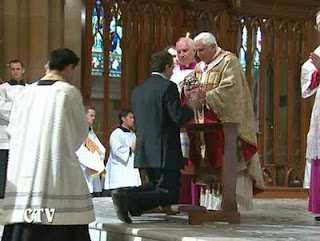10. The faithful, whether religious or lay, who are authorized as extraordinary ministers of the Eucharist can distribute Communion only when there is no priest, deacon or acolyte, when the priest is impeded by illness or advanced age, or when the number of the faithful going to Communion is so large as to make the celebration of Mass excessively long.(20) Accordingly, a reprehensible attitude is shown by those priests who, though present at the celebration, refrain from distributing Communion and leave the task to the laity.
11. The Church has always required from the faithful respect and reverence for the Eucharist at the moment of receiving it. With regard to the manner of going to Communion, the faithful can receive it either kneeling or standing, in accordance with the norms laid down by the episcopal conference: "When the faithful communicate kneeling, no other sign of reverence towards the Blessed Sacrament is required, since kneeling is itself a sign of adoration. When they receive Communion standing, it is strongly recommended that, coming up in a procession, they should make a sign of reverence before receiving the sacrament. This should be done at the right time and place, so that the order of people going to and from Communion is not disrupted."(21)
The Amen said by the faithful when receiving Communion is an act of personal faith in the presence of Christ.
12. With regard to Communion under both kinds, the norms laid down by the Church must be observed, both by reason of the reverence due to the Sacrament and for the good of those receiving the Eucharist, in accordance with variations in circumstances, times and places.(22)
Episcopal conferences and ordinaries also are not to go beyond what is laid down in the present discipline: the granting of permission for Communion under both kinds is not to be indiscriminate, and the celebrations in question are to be specified precisely; the groups that use this faculty are to be clearly defined, well disciplined, and homogeneous.(23)
13. Even after Communion the Lord remains present under the species. Accordingly, when the Communion has been distributed, the sacred particles remaining are to be consumed or taken by the competent minister to the place where the Eucharist is reserved.

1 comment:
Thank you for sharing!!
Post a Comment